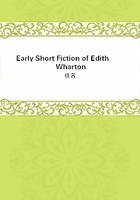
第35章
Luckily, however, she also recently inherited a tidy legacy from her grandmother; and having seen the Leonardo, on which its discoverer had placed a price far beyond my reach, she took a step which deserves to go down to history: she invested her whole inheritance in the purchase of the picture, thus enabling me to spend my closing years in communion with one of the world's masterpieces. My dear sir, could Antigone do more?"
The object of this strange eulogy had meanwhile drawn aside one of the tapestry hangings, and fitted her key into a concealed door.
"Come," said Doctor Lombard, "let us go before the light fails us."
Wyant glanced at Mrs. Lombard, who continued to knit impassively.
"No, no," said his host, "my wife will not come with us. You might not suspect it from her conversation, but my wife has no feeling for art--Italian art, that is; for no one is fonder of our early Victorian school."
"Frith's Railway Station, you know," said Mrs. Lombard, smiling.
"I like an animated picture."
Miss Lombard, who had unlocked the door, held back the tapestry to let her father and Wyant pass out; then she followed them down a narrow stone passage with another door at its end. This door was iron-barred, and Wyant noticed that it had a complicated patent lock. The girl fitted another key into the lock, and Doctor Lombard led the way into a small room. The dark panelling of this apartment was irradiated by streams of yellow light slanting through the disbanded thunder clouds, and in the central brightness hung a picture concealed by a curtain of faded velvet.
"A little too bright, Sybilla," said Doctor Lombard. His face had grown solemn, and his mouth twitched nervously as his daughter drew a linen drapery across the upper part of the window.
"That will do--that will do." He turned impressively to Wyant.
"Do you see the pomegranate bud in this rug? Place yourself there--keep your left foot on it, please. And now, Sybilla, draw the cord."
Miss Lombard advanced and placed her hand on a cord hidden behind the velvet curtain.
"Ah," said the doctor, "one moment: I should like you, while looking at the picture, to have in mind a few lines of verse. Sybilla--"
Without the slightest change of countenance, and with a promptness which proved her to be prepared for the request, Miss Lombard began to recite, in a full round voice like her mother's, St. Bernard's invocation to the Virgin, in the thirty-third canto of the Paradise.
"Thank you, my dear," said her father, drawing a deep breath as she ended. "That unapproachable combination of vowel sounds prepares one better than anything I know for the contemplation of the picture."
As he spoke the folds of velvet slowly parted, and the Leonardo appeared in its frame of tarnished gold:
From the nature of Miss Lombard's recitation Wyant had expected a sacred subject, and his surprise was therefore great as the composition was gradually revealed by the widening division of the curtain.
In the background a steel-colored river wound through a pale calcareous landscape; while to the left, on a lonely peak, a crucified Christ hung livid against indigo clouds. The central figure of the foreground, however, was that of a woman seated in an antique chair of marble with bas-reliefs of dancing maenads.
Her feet rested on a meadow sprinkled with minute wild-flowers, and her attitude of smiling majesty recalled that of Dosso Dossi's Circe. She wore a red robe, flowing in closely fluted lines from under a fancifully embroidered cloak. Above her high forehead the crinkled golden hair flowed sideways beneath a veil; one hand drooped on the arm of her chair; the other held up an inverted human skull, into which a young Dionysus, smooth, brown and sidelong as the St. John of the Louvre, poured a stream of wine from a high-poised flagon. At the lady's feet lay the symbols of art and luxury: a flute and a roll of music, a platter heaped with grapes and roses, the torso of a Greek statuette, and a bowl overflowing with coins and jewels; behind her, on the chalky hilltop, hung the crucified Christ. A scroll in a corner of the foreground bore the legend: Lux Mundi.
Wyant, emerging from the first plunge of wonder, turned inquiringly toward his companions. Neither had moved. Miss Lombard stood with her hand on the cord, her lids lowered, her mouth drooping; the doctor, his strange Thoth-like profile turned toward his guest, was still lost in rapt contemplation of his treasure.
Wyant addressed the young girl.
"You are fortunate," he said, "to be the possessor of anything so perfect."
"It is considered very beautiful," she said coldly.
"Beautiful--BEAUTIFUL!" the doctor burst out. "Ah, the poor, worn out, over-worked word! There are no adjectives in the language fresh enough to describe such pristine brilliancy; all their brightness has been worn off by misuse. Think of the things that have been called beautiful, and then look at THAT!"
"It is worthy of a new vocabulary," Wyant agreed.
"Yes," Doctor Lombard continued, "my daughter is indeed fortunate. She has chosen what Catholics call the higher life--the counsel of perfection. What other private person enjoys the same opportunity of understanding the master? Who else lives under the same roof with an untouched masterpiece of Leonardo's?
Think of the happiness of being always under the influence of such a creation; of living INTO it; of partaking of it in daily and hourly communion! This room is a chapel; the sight of that picture is a sacrament. What an atmosphere for a young life to unfold itself in! My daughter is singularly blessed. Sybilla, point out some of the details to Mr. Wyant; I see that he will appreciate them."
The girl turned her dense blue eyes toward Wyant; then, glancing away from him, she pointed to the canvas.